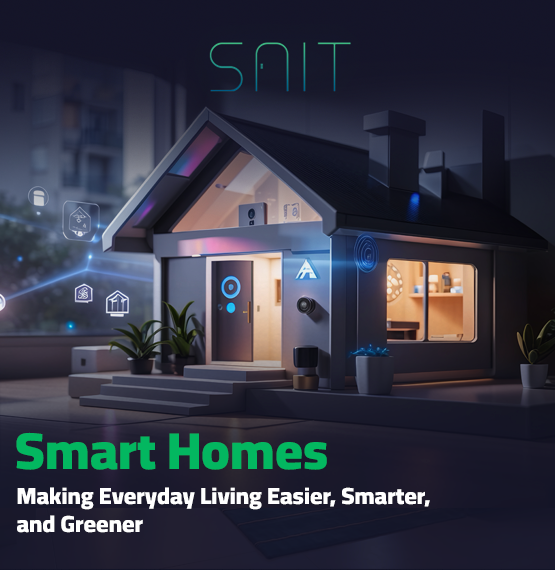Home automation makes it possible to walk into your home after a long day and, without lifting a finger, have the lights dim to your preferred setting, the thermostat adjust to the perfect temperature, and your favorite playlist start playing. Sounds like a scene from the future, right? Thanks to AI and smart home technology, this is already happening today.
The way we interact with our homes is changing fast. Home automation used to be about basic tasks like switching lights on or off. But with AI-powered smart control, our living spaces are now becoming intelligent partners that adapt, learn, and even anticipate our needs. This shift isn’t just about convenience, it’s about creating homes that are energy-efficient, secure, and perfectly tailored to our lifestyles.
The Rise of AI in Smart Homes
At first, smart home devices were pretty simple. You could program a thermostat or set a timer for your lights. But with the rise of AI, things got a lot more interesting. Today, these devices can actually learn your habits and make smart choices on their own.
For example: Take a smart thermostat. Instead of you constantly adjusting it, AI can learn your daily routine. It knows when you usually leave for work, when you get home, and when you go to bed. Using that data, it makes temperature adjustments automatically — saving energy while keeping your home comfortable.
And it doesn’t stop there. With technologies like machine learning and natural language processing, your smart devices don’t just follow commands — they understand you. Voice assistants like Alexa, Siri, and Google Assistant are perfect examples. They use AI to make everyday communication with your smart home as easy as talking to a friend.
Meanwhile, the Internet of Things (IoT) connects everything together. Your smart fridge can talk to your oven, your security cameras can talk to your smart locks, and your blinds can work with your thermostat. This level of smart control creates a seamless, connected experience where devices work together to make your home truly intelligent.
Smarter Convenience and Efficiency
One of the most prominent advantages of smart homes It’s the simplicity of everyday life. No more worrying about leaving the lights on or wasting energy heating an empty house.
Thanks to smart control and smart touch, routine tasks are automated. Lights change intensity depending on the time of day or the presence of people in the room. Smart thermostats use weather forecasts to set the perfect heating or cooling. The result? A cozy home and lower bills thanks to energy savings.
Even the kitchen is getting smarter. AI-enabled refrigerators keep track of food expiration dates, suggest recipes, and allow you to see their contents via your phone. Smart ovens can be operated remotely and prepare perfect meals as if you had a personal assistant in the kitchen.
AI Personalization
What really sets a smart home apart is its ability to adapt to your lifestyle. It’s no longer just a generic setting, it’s a fully personalized experience.
In entertainment, for example, smart speakers can create playlists to suit your mood, or suggest series and movies based on your past preferences. The more you use it, the more accurate the predictions become.
Security is getting smarter. AI-powered cameras distinguish between familiar faces and strangers, and issue instant alerts when unusual activity occurs. The result? Personalized peace of mind, not just general protection.
Even your garden benefits. Smart irrigation systems adjust the amount of water according to the weather and soil moisture, keeping plants healthy and preventing waste.
Health, comfort and quality of life
Home Automation System technology in smart homes goes beyond hardware—it creates a healthier living environment. Smart air purifiers monitor air quality and automatically remove pollutants or allergens, making them perfect for asthma or allergy sufferers. Other devices adjust humidity levels to ensure comfort throughout the year.
Smart sleep technologies are also becoming more widespread. Trackers analyze your sleep patterns and work with your lighting and thermostat to create an optimal sleep environment. Imagine the lights gradually turning off at bedtime and keeping the room at the right temperature throughout the night.
With wearables, health data such as heart rate or stress levels can be tracked, and the smart home responds with practical suggestions such as cozy lighting or movement reminders.
Challenges to consider
Smart automation energy systems offer many benefits, but they also come with challenges. The biggest concerns are data privacy and network security. With so much information being collected, it’s essential to ensure all devices are properly protected.
There’s also overdependence. When AI does all the daily tasks, we may lose the habit of doing them manually. What is needed is a balance between convenience and control. And finally, the issue of compatibility between different brands. Not all smart devices work in harmony, although industry standards are gradually improving.
The Future of Smart Homes with Artificial Intelligence
The future holds much more. Smart homes will become faster, more connected, and more sustainable. Technologies like edge computing and 5G networks will make devices more responsive.
We may even see fully autonomous homes that manage themselves, anticipate our needs, and, with Smart Automation Energy LLC, adapt in real time to our lives. From energy saving to health monitoring, the home will transform from just a place to live to an intelligent partner in everyday life.
Conclusion
Artificial intelligence is redefining what it means to live in a smart home. Thanks to smart control, smart touch and Smart Connected DevicesOur homes are more personalized, more efficient, and healthier than ever before.
Yes, There are challenges such as privacy and compatibility, but the benefits far outweigh the negatives. From lowering energy bills and enhancing security to improving quality of life, the impact of AI in home automation is enormous.
Conclusion: Smart living isn’t just a technology, it’s a lifestyle that creates homes that truly understand us. And with AI, the future of smart homes looks brighter than ever.
FQA
1. Which automation is trending now?
Smart home automation with voice control, AI integration, and energy-saving systems is trending today.
2. What is another name for home automation?
It’s also called a smart home system or intelligent home technology.
3. What is luxury home automation?
Luxury home automation offers premium, customized systems that control lighting, climate, security, and entertainment with seamless design and top-tier technology.
4. Is home automation the future?
Yes, home automation is the future, making homes more efficient, comfortable, and sustainable.
5. How do I choose a smart home automation company?
Choose a company with proven experience, reliable support, and high-quality smart systems like Smart Automation Energy LLC.
FAQs
What distinguishes a smart home from a regular home?
A smart home relies on artificial intelligence and connected devices to automate daily tasks such as lighting, temperature, and security. Thanks to smart control and smart touch, the home can adapt to your lifestyle and even anticipate your needs.
How does intelligent control improve everyday life?
Smart control allows devices to be managed automatically or with simple commands. For example, the thermostat can adjust itself according to your daily routine, while the light intensity changes according to the time of day, all without manual intervention.
What is the role of smart touch in smart homes?
Smart Touch provides an easy way to interact with devices via control panels for lighting, heating or entertainment. With AI, the experience becomes even more seamless as the home responds instantly to your preferences.
Do smart homes help save energy?
Definitely! AI-powered smart home systems learn your habits and adjust energy consumption. From preventing wasted heating and cooling to automatically turning off lights, the result is energy savings and lower bills.





